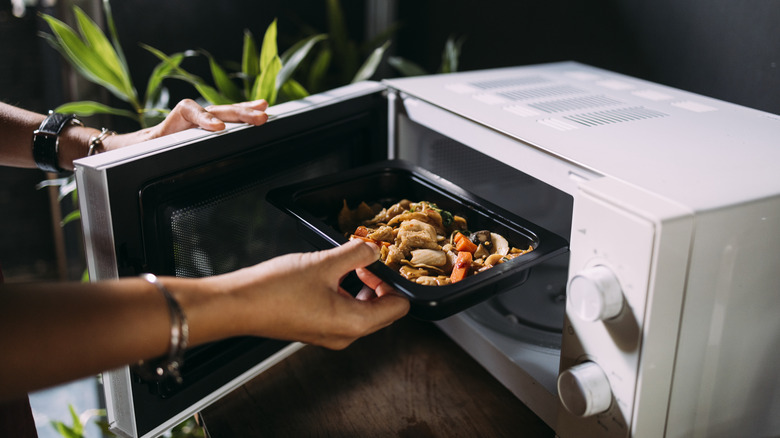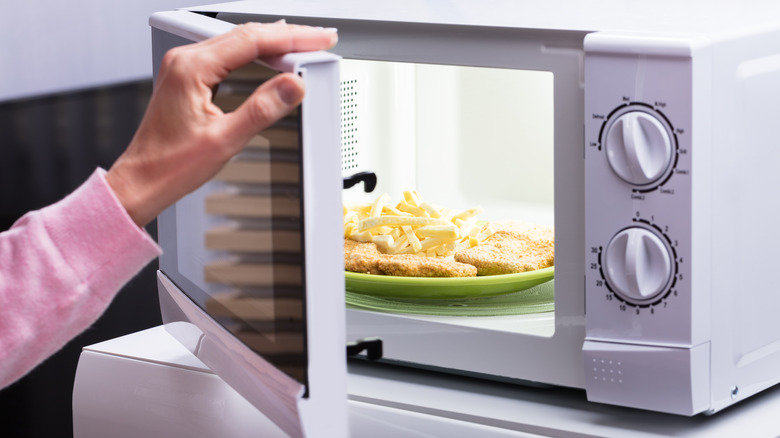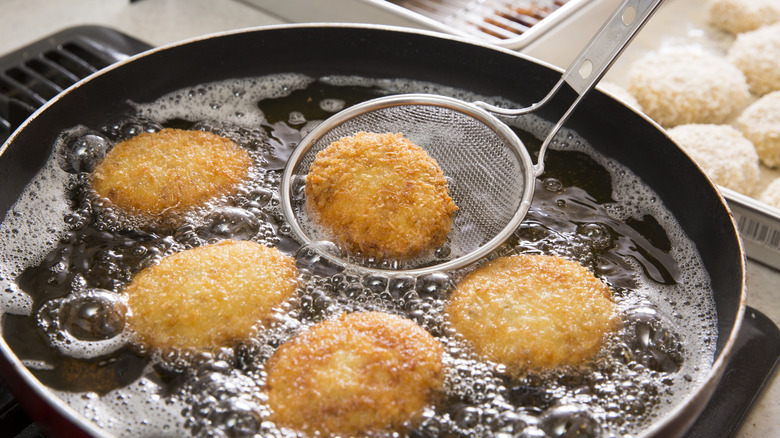Why You Should Think Twice Before Reheating Oily Foods In The Microwave
The microwave is a handy kitchen appliance you turn to at least once a day. Honestly, it's hard to imagine living in a home without one. While some people might be fond of actually cooking with a microwave, most typically use it for reheating leftovers. And all of us have had leftovers when we're in a pinch or when we cook in bulk for a few days.
While you might already know why you should never microwave your food in plastic containers, did you also know that there are certain kinds of leftover food you should think twice about putting in there? Super oily food is one of them. Yes, we're talking about that leftover Chinese fried food you brought back home from the restaurant last night or the deep-dish pizza you made the other day. What about French fries, onion rings, or particularly oily cheeseburgers? The rule is the same. Resist the urge to pop them in the microwave.
Here's why. All cooking oils have their own boiling points or heat thresholds, so to speak. Once they pass that limit, they not only lose their nutritional value, but they also emit toxic substances that are harmful to your health, per Livestrong. Certified health coach Isadora Baum wrote for Bustle, "Oils can only tolerate so much heat, so when it exceeds the threshold, it can create dangerous toxins that can be carcinogenic."
Free radicals released during the reheating process are a concern
You might not think much of throwing leftover fries in the microwave for a minute or two, but you're essentially creating an environment in which the leftover food is reheated to release free radicals that can damage healthy cells in your body.
As Dr. Andrew Weil, founder of the Andrew Weil Center for Integrative Medicine at the University of Arizona, shared: "A recent study found that a toxin called 4-hydroxy-trans-2-nonenal (HNE) forms when such oils as canola, corn, soybean, and sunflower oils are reheated. Consumption of foods containing HNE from cooking oils has been associated with increased risks of cardiovascular disease, stroke, Parkinson's disease, Alzheimer's disease, Huntington's disease, various liver disorders, and cancer."
If all this talk about oily food in microwaves is making you slant toward re-frying a batch of leftover French fries in order to get them nice and crispy (without throwing them in the microwave), think again. Per culinary expert Brad Stevens (via Southern Living), you're just going to end up with extra-greasy potatoes because you'll be frying them a third time. "You typically want to avoid reheating french fries because restaurants cook French fries twice before serving. First, they blanch them and then they fry them. By the time you order them, they were already cooked two times." Not surprisingly, cooking oil follows the same logic as reheating oily food in the microwave.
Be careful when you're trying to reuse cooking oil
If you're a fan of deep-frying food, you probably have a batch of oil in a frying pan sitting on the stove. Perhaps, you're wondering if you can use it again.
First, a few factors need to be considered. "The number of times that one can safely reuse it [cooking oil] depends on what kind of food is being fried in it, the kind of oil it is, what temperature was it heated to, and for how long," shared Dr. Soumyadeep Mukhopadhyay, Lab-In-Charge at India's MitraSK Food Testing Services (per Hindustan Times). Different oils have different smoke points. For example, avocado oil and canola oil contain high smoke points, while pumpkin seed oil and walnut oil have low smoke points. If you end up reheating an oil and pushing it past its smoke point, you're essentially doing the same thing you'd be doing by reheating oily food in the microwave. Plus, you're going to increase the formation of trans fats by reheating the oil, and trans fats raise bad cholesterol levels (LDL) and reduce good cholesterol (HDL) in your body.
Ultimately, it's worth thinking about the healthiest way to prepare and consume your food. If the microwave is actually making your food less healthy and reusing cooking oil is doing the same, avoid using those reheating methods. With leftover oily food, try throwing them in a normal oven and cooking them again on low heat (the keyword being "low").



